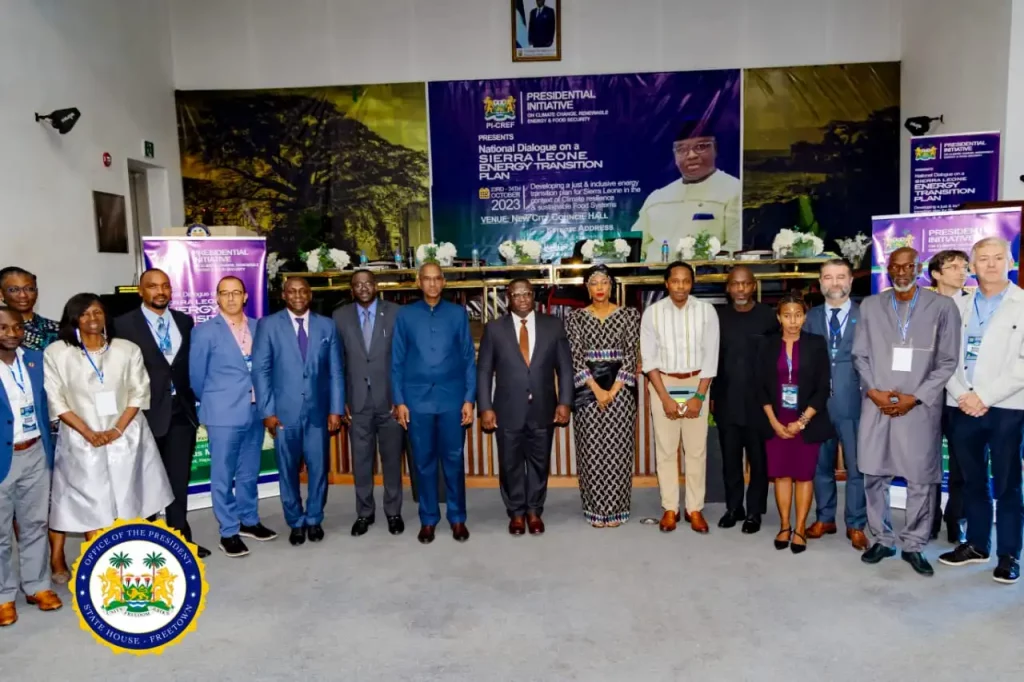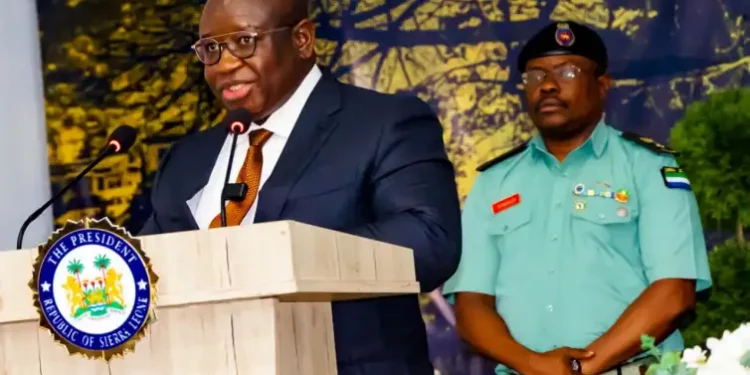By Kemo Cham
Sierra Leone presently derives majority of its energy needs from biomass, mainly fuelwood and charcoal.
According to government data, only 36 percent of the country’s over eight million population have access to electricity, which is erratic in supply at best.
But all this could change, according to a gigantic new plan announced by President Julius Maada Bio, which promises to position the country as regional leader in clean energy access, climate resilience, and food security.
The plan which was unveiled at the first ever national dialogue on just energy transition held late last month envisages a country that produces enough energy to meet its needs and to export the excess to neighbouring countries.
“Our ambitious energy plan will help us create wealth and provide access to renewable and sustainable energy for all,” said President Bio at the event dubbed: ‘National Dialogue on Just Energy Transition, Climate Resilience and Food Security.’
The two-day event brough together representatives from government, its development partners and the private sector.
President Bio spoke about the country’s vulnerability to climate variability and change, stressing the need for urgent adaptation efforts in the face of the adverse impact on communities. He also stressed that the need to transition the country toward low-carbon energy sources was crucial for combating greenhouse gas emissions and at the same time meeting its energy needs.
Sierra Leone is seeking to create one gigawatt (1GW) energy generation capacity over the next 10-15 years, according to the president. The plan, he added, entails implementation of a comprehensive energy sector reforms to provide the enabling environment to achieve at least 300 megawatts of new generation capacity by 2028, including a significant share of renewable energy to help build a climate-resilient and integrated sustainable energy sector.
But in order to achieve all this, Sierra Leone must also address persistent challenges it faces in the areas of transmission and distribution.

The National Dialogue offered a platform for the government and its partners to work towards aligning their programs and policies with President Bio’s 5 Game Changers (development priorities), which make up the country’s new National Development Plan in the making.
It also sought to identify and implement locally-led Climate Action Programs and initiatives for lives and livelihoods, with the overall goal of contributing to the objectives of the United Nations Conference of the Parties on Climate Change.
Part of the task of those in charge of the national dialogue was to establish a financing mechanism to ensure the realization of these objectives.
Climate vulnerability
According to the United Nations (UN), Sierra Leone is among the 10 percent of countries in the world that are most vulnerable to the adverse consequences of climate change, and presently one of the least able to cope with the effects.
Almost every year, the country experiences devastating flooding. Landslides and mudslides have become an almost regular occurrence during the rainy season.
For Babatunde Ahonsi, UN Resident Coordinator for Sierra Leone, the national dialogue offered an opportunity for Sierra Leone to develop bankable projects that could attract funding from the “growing streams of international climate finance opportunities.”
Providing access to energy is one of the major priorities of the Bio administration in the next five years, as articulated by the President following his re-election for a second and final five-year term.
At the dialogue event, he spoke about the importance of collaboration to foster economic development while navigating the challenges posed by climate change.
Bio also said that the inaugural dialogue built on his government’s “proactive” participation at the Africa Climate Summit in Nairobi, Kenya in September, and the United Nations Climate Week on the sidelines of the UNGA78 in New York later in the same month.
“Our nation’s low access to modern energy undermines its development goals and ability to build climate resilience,” Bio said, adding: “Moves toward low carbon sources of energy to reduce global greenhouse gas (GHG) emissions are of paramount importance.”
He however stressed that these moves must be compatible with achieving the country’s development aspirations and meeting the unmet energy needs.
Food security
According to the government, the plan for a just energy transition was hatched far back in 2019, with the establishment of a standalone Ministry responsible for the Environment and Climate Change.
After the 2023 elections, President Bio announced the setting up of the Presidential Initiative on Climate Change, Renewable Energy and Food Security (PI-CREFS), which is tasked with coordination and provision of strategic guidance and support, and to facilitate collaboration and partnerships to provide the investments and resource mobilisation needed to achieve this goal.
PI-CREFS, which is headed by a former UN Special Envoy on Renewable Energy Dr Kandeh Yumkella, organized the national dialogue, which came about a week after the launch of ‘FEED SALONE,’ an initiative designed to transform the country to food self-sufficiency.
FEED SALONE is an important component of PI-CREFS, and it aligns with the government’s stated intention to utilise clean energy to promote climate-smart agriculture and agro-industrialisation.
Yumkella was quoted saying at the opening session of the dialogue that addressing the intertwined challenges of climate change, low access to energy, subsistence agriculture, unemployment and high levels of poverty would demand a comprehensive approach to planning and implementation, with a strategic focus on resolving pressing development challenges at the intersection with other key development ambitions and priorities.
“The goal is to build strong coalitions and partnerships of local and international actors who can take the lead in developing cost-effective and scalable solutions,” he said.






















